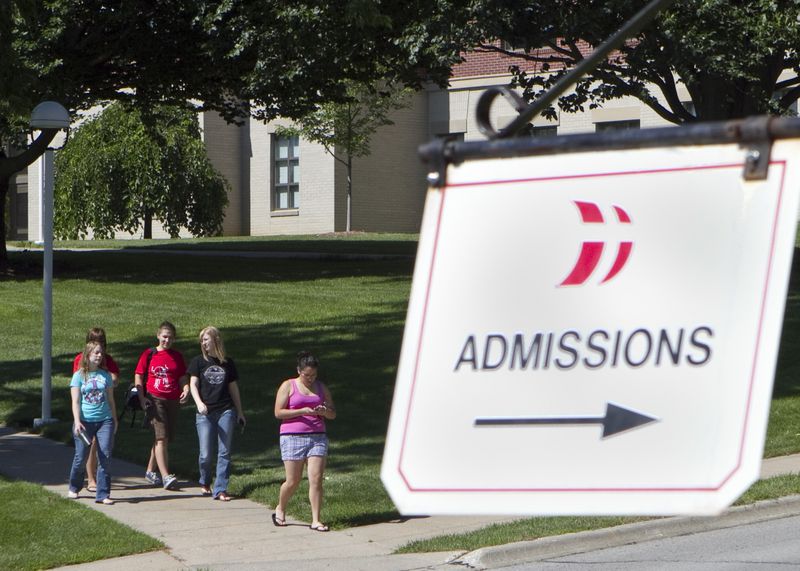Keeping with our college theme over the last day, here is some practical advice for high school students from Carol Barash, author of "Write Out Loud" and founder and CEO of Story2.
By Carol Barash
The college landscape is shifting rapidly, with families asking which colleges are best and which are worth the cost. Here are some questions to help you decide what school you should attend, and how college fits in your larger work and life plan.
Credit: Maureen Downey
Credit: Maureen Downey
What if you are admitted to the colleges you want? If you’re choosing between colleges, ask yourself:
Am I ready for college? For most students college is a big change. Classes are interspersed throughout the day. There are many long-term projects. And you only get the help you need if you ask for it. You'll need to do your own laundry, manage your own money, diet and sleep. Begin fostering the habits of mind – including self-awareness, self-discipline and persistence – to succeed in college.
Do I have a viable plan to pay and stay in college? Many students stumble in the large, lecture-style gateway courses that they encounter freshman year, wasting precious scholarships – and time – landing on their feet. Talk with a financial aid officer at the college you're planning to attend. Ask them the real, all-in cost of college, how long students really need to finish, and what are the common pitfalls you need to avoid to finish in four years.
What do I need to start strong and do my best? Maybe in high school you've had extra time on tests, or prefer essay questions to multiple-choice. Perhaps you struggle with writing, and have relied on a writing tutor in high school. Or maybe you learn best through practical experience. Be honest about what you need to succeed, and choose a college with programs and services that fit your learning style.
What if you don't get into the colleges you want? Then you want to think about:
Is college what I need next? With many large companies – including Ernst & Young and Google – rethinking the college requirement for entry-level jobs, you may not need college to get a jumpstart on a solid career. Maybe, instead of college, you want to get a job and save money for college later. Look for companies like Starbucks with management training programs for long-term professional success. Some will pay for all or part of college.
If yes, what are my other choices? Make sure to check out all your local college options. You may be able to start in the summer or winter, instead of fall. There may be an adult learning program that provides access to similar courses and is more flexible. Or, if your grades were so-so in high school, you can often fill the gaps at a community college, and then apply to transfer to a four-year college. Be strategic; think about what you want to gain from college, not just which specific college.
If not college, what does the next chapter look like? If you feel burnt out from high school, a bit anxious and confused, you'll find many year-long service learning and experiential learning programs – such as Global Citizen Year or Uncollege – and many offer scholarships. Sometimes you can use Pell Grants to learn coding, or for other career-track courses. Consider all your options for courses, career and community learning before making your final choice.
You also want to ask how college fits with your career and life plan. If you are graduating from high school this year, you will switch jobs at least five times, and most of the jobs you’ll have don’t even exist yet! Here are three things you should think through with that uncertain future in mind:
•You can’t count on college to get you your first job: With the exceptions of accounting and computer science, there are very few college majors that lead straight into a first job. So what do you need to do – in addition to your courses – to be prepared for the world of work? Include internships, work-study, and experiential learning in your overall learning mix to be ready to jump into your first job.
•Use college to prepare for 21st-century careers: College is still, for the most part, organized around subject matter. In college they’re called “majors.” The Internet calls this “content,” and since it’s so readily available it’s not as valuable as it once was. Future jobs will go not to people who know content, but to people who can assess and communicate the value of content. Whatever else you study in college, upgrade your written and spoken communication skills and learn to analyze data (statistics).
•Educational debt is dangerous: As the cost of college has risen dramatically over the past 20 years, families have taken on more and more debt. Do whatever you can to avoid student loans, especially ones with high interest.
There is an old Yiddish saying, “Man plans, and God laughs.” While it’s important to plan and make the best decisions you can, there is an element of surprise and discovery in education. Remember to stay open to what you are learning not only from your classes, but also from your friends and your community – and be willing to create new opportunities when the old paradigms no longer work for you.







